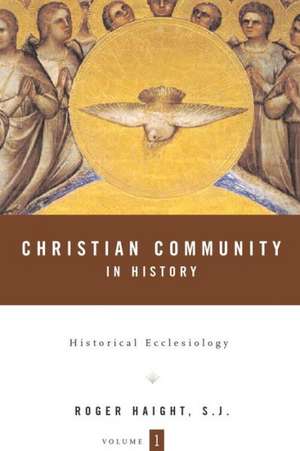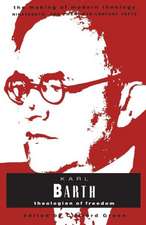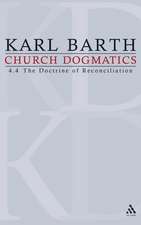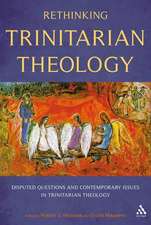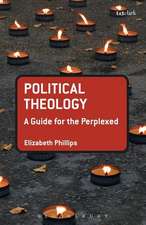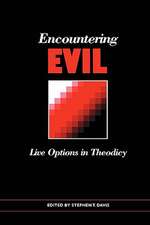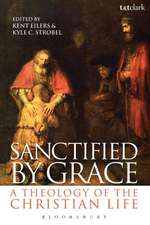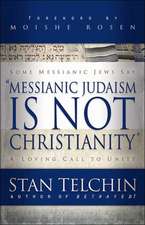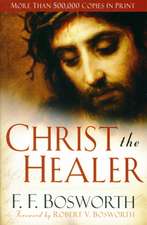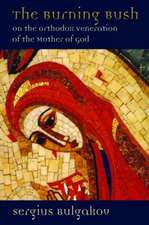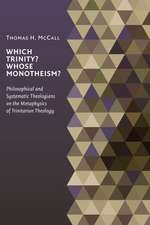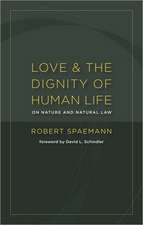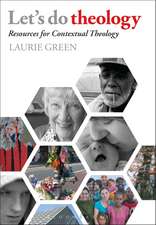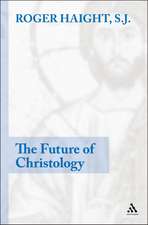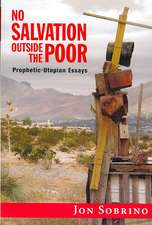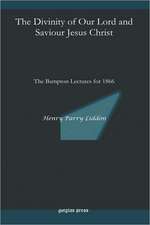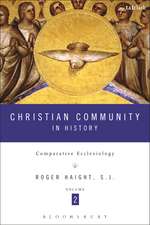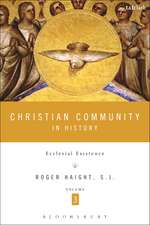Christian Community in History Volume 1: Historical Ecclesiology
Autor Rev Prof Roger D. Haighten Limba Engleză Paperback – 18 iun 2014
| Toate formatele și edițiile | Preț | Express |
|---|---|---|
| Paperback (1) | 245.11 lei 3-5 săpt. | |
| Bloomsbury Publishing – 18 iun 2014 | 245.11 lei 3-5 săpt. | |
| Hardback (1) | 399.54 lei 6-8 săpt. | |
| Bloomsbury Publishing – 30 sep 2004 | 399.54 lei 6-8 săpt. |
Preț: 245.11 lei
Preț vechi: 309.58 lei
-21% Nou
Puncte Express: 368
Preț estimativ în valută:
46.91€ • 48.67$ • 39.21£
46.91€ • 48.67$ • 39.21£
Carte disponibilă
Livrare economică 24 februarie-10 martie
Preluare comenzi: 021 569.72.76
Specificații
ISBN-13: 9780567231543
ISBN-10: 0567231542
Pagini: 464
Dimensiuni: 156 x 234 x 33 mm
Greutate: 0.73 kg
Ediția:New.
Editura: Bloomsbury Publishing
Colecția T&T Clark
Locul publicării:London, United Kingdom
ISBN-10: 0567231542
Pagini: 464
Dimensiuni: 156 x 234 x 33 mm
Greutate: 0.73 kg
Ediția:New.
Editura: Bloomsbury Publishing
Colecția T&T Clark
Locul publicării:London, United Kingdom
Caracteristici
Offers
explorations
of
theological
interpretation
and
intertextuality
of
the
Scripture
Notă biografică
Roger
Haight,
SJ,
has
a
PhD
from
the
University
of
Chicago,
USA
(1973)
and
a
STL
from
the
Jesuit
School
of
Theology
in
Chicago,
USA
(1981).
He
has
taught
for
over
30
years
in
Jesuit
schools
of
theology
in
Chicago,
Toronto,
the
Philippines,
and
Cambridge,
Massachusetts.
He
has
been
a
visiting
professor
in
France,
India,
Peru,
and
Kenya.
He
is
a
past
president
of
the
Catholic
Theological
Society
of
America
(1994/95).
Cuprins
PrefaceIntroductionPart
I:
The
Question
of
Method1.
Historical
EcclesiologyPart
II:
The
Formation
of
the
Church2.
Genesis
of
the
Church3.
The
Pre-Constantinian
Church4.
The
Post-Constantinian
Church5.
The
Gregorian
Reform
and
the
New
Medieval
Church6.
Conciliarism
and
the
Late
Medieval
ChurchIndex
Recenzii
"While
maintaining
the
theological
nature
of
his
study,
Roger
Haight's
historical
ecclesiology
lays
a
sturdy
foundation
in
a
historical,
sociological
analysis
of
the
beginnings
and
development
of
the
Christian
Church
from
its
origin
in
Jesus
of
Nazareth
to
the
eve
of
the
Reformation....
This
is
a
groundbreaking
volume...
Haight
has
served
all
ecclesiologists
well
by
initiating
a
way
of
looking
at
ecclesiology
as
it
develops
on
the
ground,
so
to
speak.
He
has
done
it
with
theological
integrity
and
clear
analyses.
He
challenges
us
all
to
understand
differences
as
values
and
the
most
appropriate
way
for
the
incarnation
to
continue
through
human
history,
honoring
both
the
human
and
the
divine
whether
in
the
stable
or
the
palace
of
the
council
chamber."
-Catholic
Studies/
http://www.CatholicBooksReview.org/,
2005
Cover Story Feature on Haight -National Catholic Reporter, 2/25/05
"While maintaining the theological nature of his study, Roger Haight's historical ecclesiology lays a sturdy foundation in a historical, sociological analysis of the beginnings and development of the Christian Church from its origin in Jesus of Nazareth to the eve of the Reformation...each chapter concludes with a social historical analysis and a few illuminating pages that draw out principles for historical theology. It is these analytic pages that set Haight's book apart from other studies...This is a groundbreaking volume." -Catholic Books Review, 2005
"Haight presupposes a Christian unity in the face of religious pluralism within the historical context of postmodernity..."- Susan K. Wood
Roger Haight's two-volume Christian Community in History is an ambitious, multi-layered work that defines the common divisions in ecclesiological approaches. In integrating a history of the church with both theological and social scientific analyses, Haight adopts themes that James Gustafson explored decades ago in Treasure in Earthen Vessels, but which have pretty much disappeared from ecclesiology ever since.
"Haight displays a laudable awareness of the complexity of issues.... Ultimately, though, what will give this book landmark status in the discipline of ecclesiology will be its method; it is a truly critical and historical study in a discipline struggling with how to order itself in the contemporary theological world." -Anglican Theological Review
"Haight proceeds with a historical analysis of the self-constitution of the Church from its origins as a Jesus movement to the heights of medieval Christendom and concludes the volume with the era of conciliarism in the late medieval Church. Several of the essays cast light on the act of reading scripture as a theological exercise, as an encounter with the divine. Thus, a common thread running through this volume is the theological conviction that the prime subject of scriptural interpretation is in fact the self-revealing God. Other contributions offer fascinating explorations of theological interpretation and intertextuality as exemplified with the scripture itself. Haight's study of late medieval ecclesiology sheds light on the all but forgotten influence of conciliarism in healing the Western rift in the papacy. While I find the author's historical study quite insightful. I found this a very helpful, scholarly trek though the major developments in the Roman Catholic Church's self-understanding." -Toronto Journal of Theology
"After gaining much renown for his Christology from below Haight applies his methodology to ecclesiology. In this first of a projected two-volume ecclesiology from below, Haight traces the history of the church from its beginnings into the late Middle Ages, concluding with a positive assessment of conciliarism.... Recommended." -Choice, 5/05
"I salute Haight for the extraordinary accomplishment represented in this two-volume work..."- Richard P. McBrien, Horizons
"Haight's comparable efforts to find methods based on a hermeneutics of authors, a hermeneutics of texts, and a hermeneutics of receivers can open up a common ground amidst diverse viewpoints for understanding the church, foster new formulations about the church's identity and mission, and affirm common practices."- Bradford E. Hinze, Religious Studies Review
[Part of a] landmark work ... Unlike other books on church history or ecclesiology, this is not one with a 'hidden author' ... Instead, Haight constantly engages the reader by explaining what he is doing and why he is doing it, and also by introducing topics such as historical consciousness, globalization, religious pluralism, and contemporary secularism.
Review in German in Theologische Literaturzeitung 131 (2006)
Cover Story Feature on Haight -National Catholic Reporter, 2/25/05
"While maintaining the theological nature of his study, Roger Haight's historical ecclesiology lays a sturdy foundation in a historical, sociological analysis of the beginnings and development of the Christian Church from its origin in Jesus of Nazareth to the eve of the Reformation...each chapter concludes with a social historical analysis and a few illuminating pages that draw out principles for historical theology. It is these analytic pages that set Haight's book apart from other studies...This is a groundbreaking volume." -Catholic Books Review, 2005
"Haight presupposes a Christian unity in the face of religious pluralism within the historical context of postmodernity..."- Susan K. Wood
Roger Haight's two-volume Christian Community in History is an ambitious, multi-layered work that defines the common divisions in ecclesiological approaches. In integrating a history of the church with both theological and social scientific analyses, Haight adopts themes that James Gustafson explored decades ago in Treasure in Earthen Vessels, but which have pretty much disappeared from ecclesiology ever since.
"Haight displays a laudable awareness of the complexity of issues.... Ultimately, though, what will give this book landmark status in the discipline of ecclesiology will be its method; it is a truly critical and historical study in a discipline struggling with how to order itself in the contemporary theological world." -Anglican Theological Review
"Haight proceeds with a historical analysis of the self-constitution of the Church from its origins as a Jesus movement to the heights of medieval Christendom and concludes the volume with the era of conciliarism in the late medieval Church. Several of the essays cast light on the act of reading scripture as a theological exercise, as an encounter with the divine. Thus, a common thread running through this volume is the theological conviction that the prime subject of scriptural interpretation is in fact the self-revealing God. Other contributions offer fascinating explorations of theological interpretation and intertextuality as exemplified with the scripture itself. Haight's study of late medieval ecclesiology sheds light on the all but forgotten influence of conciliarism in healing the Western rift in the papacy. While I find the author's historical study quite insightful. I found this a very helpful, scholarly trek though the major developments in the Roman Catholic Church's self-understanding." -Toronto Journal of Theology
"After gaining much renown for his Christology from below Haight applies his methodology to ecclesiology. In this first of a projected two-volume ecclesiology from below, Haight traces the history of the church from its beginnings into the late Middle Ages, concluding with a positive assessment of conciliarism.... Recommended." -Choice, 5/05
"I salute Haight for the extraordinary accomplishment represented in this two-volume work..."- Richard P. McBrien, Horizons
"Haight's comparable efforts to find methods based on a hermeneutics of authors, a hermeneutics of texts, and a hermeneutics of receivers can open up a common ground amidst diverse viewpoints for understanding the church, foster new formulations about the church's identity and mission, and affirm common practices."- Bradford E. Hinze, Religious Studies Review
[Part of a] landmark work ... Unlike other books on church history or ecclesiology, this is not one with a 'hidden author' ... Instead, Haight constantly engages the reader by explaining what he is doing and why he is doing it, and also by introducing topics such as historical consciousness, globalization, religious pluralism, and contemporary secularism.
Review in German in Theologische Literaturzeitung 131 (2006)
